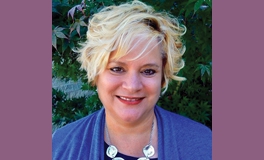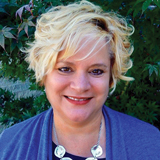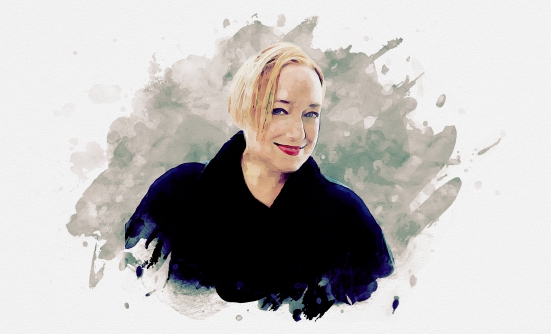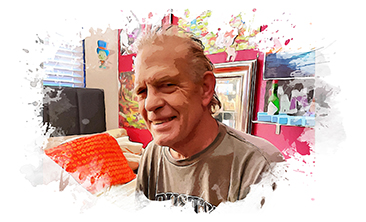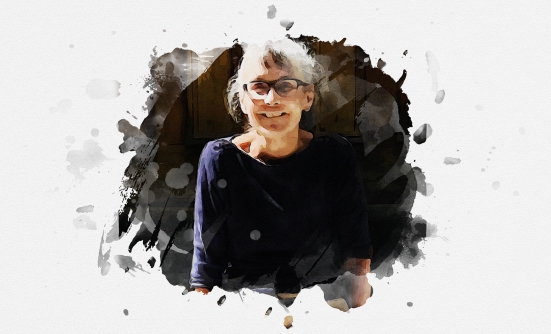It was Easter weekend in 2012, I was 46 years old with a full-time job, a hard-working husband, and 3 kids—2 in college and 1 in third grade. I discovered the lump one morning just after waking up. I knew it was the first time I’d ever noticed it. A few restless days and nights later, my worst fears were confirmed.
I was diagnosed with triple-negative breast cancer (or TNBC). At the time, I was working at the cancer center at my local hospital. Believe me, the irony was not lost on me. I’d spent years comforting patients after they received life-altering diagnoses. Now, my life had been altered.
Carrying on after Surgery
The first step was surgery. It was a claimed success—the cancer hadn’t spread to the lymph nodes and was thought to have been completely removed. The first oncologist recommended standard treatment as a precaution, which meant rounds of chemotherapy, followed by radiation. While receiving treatments, I tried to carry on as normal as possible. I continued working full-time, even when it felt impossible to get out of bed in the morning. I never missed a day of work apart from receiving a treatment.
Nearly a year after first discovering the lump, I completed my treatments and received a clean bill of health. I immediately started researching “maintenance” drugs and clinical trials that could act as a supplement to keep me cancer-free, but there was hardly anything available for triple-negative breast cancer.
I searched for hope, but found nothing except for one-off success stories, with no proved track record. One year passed with clear CT scans, then another and another. I felt great, and life was good. Then there was pain.
2 Weeks Before Christmas
My fourth year into remission, I started having left-sided weakness and sharp stomach pain. My doctor dismissed my concerns, but my intuition screamed for a second opinion.
I visited the employee health clinic at the hospital where I worked and listed my symptoms along with my medical history. They immediately ordered a CT scan, which revealed I had a mass on my left adrenal gland, and tumors throughout my abdominal area. The biopsy results showed that the triple-negative breast cancer had returned and metastasized. It was 2 weeks before Christmas 2015.
We were devastated, but I was well aware of how far research had advanced in the years during my remission. Still, I thought my days were numbered. I prepared myself for the get-your-affairs-in-order speech. In the days that followed, I was consumed with longing for hope, while constantly struggling with the knowledge that my situation wasn’t different from that of countless women I had watched lose their lives to this disease.
One thing was certain—my husband and kids were not going to let me take this news lying down. Giving up was not an option. We were ready to fight—we just needed to know how.
Breath of Fresh Air
Dr. Karpurapu, my new oncologist, was like a breath of fresh air. We had worked together at that point for a couple of years. One afternoon, she called me into her office to discuss my options. She noticed the panic in my eyes, grabbed my hand, and said, “Sam, you will live.” Those words became my family’s mantra.
She told me that she was recommending me for a cutting-edge clinical trial called IMpassion130 at Sarah Cannon Research Institute at Tennessee Oncology in Nashville. The study was spearheaded by Erika Hamilton, MD, Director of the Breast Cancer and Gynecologic Cancer Research Program at Sarah Cannon Research Institute, who would become my third oncologist.
New Momentum: Clinical Trial
I met with Dr. Hamilton a couple of weeks into the new year. She explained that this clinical trial would be different, because we were going to treat cancer like a manageable disease. The goal was to keep my lifestyle the same regardless of treatment. We discussed everything from expectations to limitations.
After leaving Sarah Cannon, I felt proactive in the face of cancer for the first time. Even though my cancer had come back, I wasn’t finished.
I started receiving treatments through the clinical trial at the beginning of February 2016. It involved a dual treatment that consisted of standard chemotherapy and immunotherapy. The trial itself was a blind study, meaning that I would either receive immunotherapy or a placebo, in addition to standard chemotherapy with paclitaxel. The chemotherapy caused all the typical side effects, from hair loss to nausea, but it was all manageable. Through it all, I have continued to work full-time.
Eight weeks after being in the study, I had my first CT scan. The results showed that every tumor in my abdomen had shrunk, including the one on my adrenal gland. We were floored, and it was full steam ahead. With every round of treatment and CT scans, my tumors continued to shrink.
In 2018, I stopped taking paclitaxel, because of neuropathy, a side effect that flares as a result of receiving immunotherapy and chemotherapy for an extended period. Although we were still uncertain whether I was receiving immunotherapy, Dr. Hamilton agreed to stop my chemotherapy and allow me to take the study drug atezolizumab solely.
Since then, every CT scan to this day has been clear. In November 2018, Dr. Hamilton called to let me know that the study had been unblinded, and that I had, in fact, been receiving the immunotherapy atezolizumab all along.
Listen to Your Body
This clinical trial gave me my life back. To anyone with a triple-negative breast cancer diagnosis who is reading this story, my advice is: do your research, surround yourself with doctors who are willing to listen, and trust your body. Your days are not numbered. You will live.





